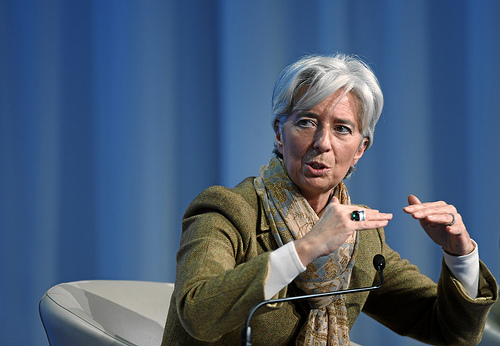Libido and Leadership
Women Make Better Politicians
She ranks two notches below Queen Elizabeth on Forbes’s World’s 100 Most Powerful Women. She is four slots better than Meg Whitman and eight above Carly Fiorina, both former hi-tech CEOs who spent (unsuccessfully) mega-bucks in their attempts to become high-powered California politicians.

She is Christine Lagarde, number 43 on Forbes’ coveted luminary poll. She earned the top gig at the international law firm Baker & McKenzie and then at 51 achieved elite political status in 2007 as France’s Minister of Finance. The woman who spent 30 years clawing to the top rung on legal and political ladders, without a slip, champions a Freudian angle to leadership. It’s all about psyche.
The French finance czar, during a recent appearance on ABC’s This Week and following tough talk on fiscal austerity and the evils of budget deficits, dives headlong into the squishy topic of gender leadership. Her cardinal thesis: Women are better leaders than men.
“We don’t necessarily project our own egos into cutting a deal, [getting] our point across, convincing people, reducing them to … a partner lost in the process.” Then, with a hint of mettle, she cuts to the chase: “We inject less libido, less testosterone.”
I give Lagarde’s gender theory high marks when tested against the political culture in the U.S.—one that has become indisputably partisan and polarized. Our male-dominated political leadership is unable to reverse this trend and is largely seen as the polarizing force. Ideology has become so rigid that lawmakers’ stances, even on complex, multidimensional issues, are predictable—often before the debate begins.
Testosterone and libido rule inside Washington’s beltway. Spin and gridlock trump authenticity and reconciliation.
Lagarde succeeded me as chair of Baker & McKenzie in 2000 before tackling France’s top finance post. Like me, she was endlessly reminded by our male-dominated partnership that her mandate included tolerantly “herding 525 cats.” Lagarde viewed her partners as professionals but, consistent with this saying, the task was thankless and near impossible. Yet this French attorney successfully grew this demanding brood of counselors and its business, stepping down unscathed in 2005.
Rated by the Financial Times last year as Europe’s top finance minister, Lagarde brings a no-nonsense authenticity to problem solving. Advocating tax cuts for her countrymen to the French Parliament, she took a Bronx-like swipe at the French elite, admonishing them to stop pontificating and turn theory into reality: “I would like to tell you: Enough thinking, already,” she said. “Roll up your sleeves.” Lagarde went on to cite 19th-century French historian extraordinaire Alexis de Tocqueville’s Democracy in America, exhorting the French to work harder, earn more, and pay lower taxes on their wealth.
Lagarde’s gender braggadocio is supported by empirical data. Leadership studies show women outperform men in the key area of decision making: they use a more democratic, participative style while men take a more autocratic, directive approach. These studies conclude that women’s approach to negotiation, mediation, facilitation, and communication is the more effective leadership style, compared to men’s insistence on power and control.
So if women make better bosses, why do few make it to the top? Heading into the November mid-term elections, just 16 percent of the Congress was female and only 15 women (3 percent) hold the top spot at a Fortune 500 company. A Pew Report cites a host of reasons, including gender discrimination, resistance to change, a self-serving “old boys club,” and family responsibilities; but also confirms that women inherently have what it takes to be good leaders.
The November election provided voters an opportunity to test Lagarde’s theory of id. The election’s results indicate voters are ready to try it, though so far on a modest scale. Six of 15 women Senatorial candidates won their races; 72 of 138 prevailed in the House; and in the Gubernatorial races, four of the 10 that tossed their bonnet into the ring succeeded.
Lagarde’s boss’s well-publicized and over-sized ego is solid evidence proving her point. President Sarkozy took yet another hit recently when a journalist speculated he was 45 minutes late for a meeting with Forbes’s number 41, the Queen herself, busy attending to the amorous needs of his wife and former model, Carla Bruni-Sarkozy. Lagarde is diplomatically mum about how her leadership and gender thesis plays out at the Élysée Palace.



